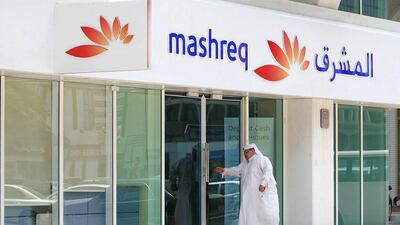Mashreq said profit rose 13 per cent in the first quarter as the economy showed resilience in the face of a steep drop in oil.
The Dubai-based bank’s net income from January to March rose to Dh651 million from Dh575m in the same period the previous year, boosted by gains in net interest income. Total assets increased 14 per cent to Dh107 billion at the end of March from the same month last year.
“Our results reflect the continued stability of the UAE economy in the face of the disruption in the oil market,” said AbdulAziz Al Ghurair, the chief executive.
“The banking industry and Mashreq in particular has displayed a remarkable immunity to the resultant economic turmoil in the region.”
As banks in the UAE scramble to lure individual customers – clients that give them higher margins than less risky corporations and businesses – Mashreq has been beefing up its product offerings this year.
During the fist quarter, the lender rolled out the UAE’s first “selfie” credit card, which allows customers to include a photo of themselves on the card.
Credit cards are one of the most profitable products for banks with interest rates usually exceeding 2 per cent a month.
The bank also updated its mobile phone application, App Snapp, with new functions. Lenders are increasingly focused on such technological capabilities as they look to serve affluent customers that prefer to do financial transactions outside of bank branches.
Last year, the UAE economy is estimated to have grown more than 4 per cent, even after the price of oil fell more than 50 per cent during the second half. As a result of the drop, many economists, including those at HSBC and Standard Chartered, have lowered their growth forecasts for Arabian Gulf countries this year.
Over the weekend, the IMF also cut its projections for the UAE’s growth this year to 3.2 per cent – a decrease of 0.3 percentage points against its January forecast.
mkassem@thenational.ae
Follow The National's Business section on Twitter

